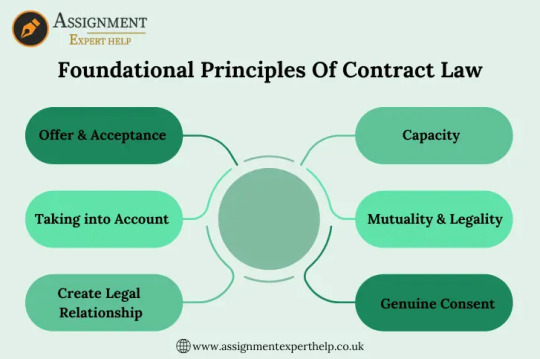#Principles of contract law
Explore tagged Tumblr posts
Text
Understanding The Key Principles of Contract Law

Creating contracts is important for anyone involved in legal agreements. Learn about the key principles of contract law Our expert team will teach you how contract law works. Basic knowledge of key principles of contract law helps you achieve your goal of writing work.
#Principles of contract law#basic contract law principles#freedom of contract law#basic contract principles
0 notes
Text
Foundational Principles Of Contract Law

The key principles of contract law are essential for law students. Key principles of contract law, as provided on our website, include offer and acceptance, consideration, intention to create legal relations, and capacity to contract. Additionally, contract law covers the terms of the contract, potential breaches, and available remedies
0 notes
Text
Principles Of Contract Law Every Law Student Should Know

Unlock the Core Principles of Contract Law, Crucial for Every Law Student’s Understanding. Dive into the fundamental concepts: mutual agreement, honesty, clear terms, fairness, written documentation, thorough contract review, and the ramifications of breaches. Mastering these principles lays a solid foundation for navigating the intricate world of legal contracts.
#Law assignment help#expert assignment help#quality law assignment help#Principles of contract law#basic contract law principles#freedom of contract law#basic contract principles#contract principle
0 notes
Text
Foundational Principles of Contract Law

Key Principles of Contract Law Every Law Student Should Know are foundational to understanding legal agreements and obligations. At its core, contract law governs the creation and enforcement of agreements between parties. Essential principles include offer and acceptance, where one party makes an offer that the other accepts, creating a binding agreement. Consideration refers to the value exchanged between parties, which can be money, services, or goods. Capacity ensures that parties entering into a contract are legally able to do so, while legality ensures that the contract's purpose is lawful. Lastly, the intention to create legal relations confirms that both parties intend the agreement to be legally binding. Understanding these principles is vital for law students, as they form the basis of most legal transactions and disputes.
0 notes
Text
Understanding Contracts in Law: Key Concepts and Principles
Discover the essentials of contracts in law with our concise guide. Learn about key elements such as offer and acceptance, consideration, and the intention to create legal relations. Understand different types of contracts and their importance in providing legal protection and preventing disputes in various agreements.
#Types Of Contracts#Contract Law#Legal Agreements#Business Contracts#Legal Obligations#Contract Principles
1 note
·
View note
Text
In 2020, Robert Kuciemba, a woodworker in San Francisco was infected with covid by a co-worker after his Nevada-based Victory Woodworks transferred a number of sick workers to the San Francisco site for a few months.
Through the proceedings of the case it turns out that the employer knew some employees might be sick but they transferred them anyway and ignored a San Francisco ordinance in place at the time to quarantine suspected covid cases.
Kuciemba was subsequently infected and he then infected his wife, who ended up in ICU on a ventilator.
The California Supreme Court just ruled against Kuciemba on the basis that a victory, while, in the court's words, "morally" the right thing to do, would create "dire financial consequences for employers" and cause a "dramatic expansion of liability" to stop the spread of covid.
There’s a few stunning details to note in this case. First, the court agreed that there is no doubt the company had ignored the San Francisco health ordinance. In other words, they accepted the company had broken the law. And then concluded “yeah, but, capitalism.”
Secondly, the case was so obviously important to the struggle between capitalism and mass infection that the US Chamber of Commerce, the largest business lobbying organisation got involved and helped the company with its defence. Remember, this is a tiny company in a niche industry. The involvement of the biggest business lobbyists in the country tells us a lot about the importance of the principle they knew was at stake.
Thirdly, the defence of the company is very telling. They said “There is simply no limit to how wide the net will be cast: the wife who claims her husband caught COVID-19 from the supermarket checker, the husband who claims his wife caught it while visiting an elder care home."
Well, exactly. Capitalism couldn’t survive if employers were liable for covid infections contracted in the workplace, and the ripple effect of those infections. And they know it.
This case is something of a covid smoking gun, revealing what we always suspected but had never seen confirmed in so many words: the public health imperative of controlling a pandemic virus by making employers liable for some of that control is, and always must be, secondary to capitalist profit.
This ruling is also saying out loud what has been obvious to anyone paying attention for the last two years: employers don’t have a responsibility to keep your family safe from covid. You have that responsibility. And if you give a family member covid that you caught at work and they get sick or die – even if it was a result of law-breaking by your employer – that’s on you buddy.
It is the same old capitalist story: the shunting of responsibility for ills that should be shared across society, including employers in that society, onto individuals.
This ruling essentially helps codify workplace mass infection and justifies it as necessary for the smooth functioning of capitalism.
This is not new. This is where the ‘just a cold’ and the ‘mild' narrative came from. It came from doctors and healthcare experts whose first loyalty was to capitalism. Not to public health. To money, not to lives. Abetted by media who uncritically platformed them.
While this ruling tells us little that we couldn’t already see from the public policy approach of the last two years, it is revealing (and to some extent validating) to see it confirmed by the highest law of the land in the United States.
8K notes
·
View notes
Note
genuine question why are charter schools to blame for decreased literacy in your opinion? Because of the remote learning aspect or smth else also?? I went to one & honestly did better with it than traditional hs but I had very high reading comprehension already, had no busses in my area & no parent that could drive me to school so it was a pretty specific situation where that environment worked out better for me
Well I’m glad it worked out for you but institutionally charter schools are so detrimental to public education. Let me explain why:
The principle behind charter schools, that increased competition will force public schools to be better, frames education as a product rather than a public utility. If education quality is determined by the free market, the winners and losers are children, which is just a morally unacceptable outcome to me.
Shouldn’t ignore that the school choice movement started as a way to advocate for the perpetuity of segregation. On average charters are more racially segregated than publics.
The way in which public schools receive funding varies state to state, but most states do some amount of funding per pupil. What that means is that when students switch from public schools to charter schools they take that per people funding with them if you’re leaving an underperforming public school that’s underperforming because it’s underfunded you are making the problem worse. Not everyone can leave.
Charter schools can legally kick students out if they want to. This means if students stop performing well, or if disabled or english-language learner students need extra support, they can just be removed. A lot of “charters have higher test scores” is just charters only admitted high-performing and low-need students, which puts even more of a strain on public schools.
They are really unregulated. Many “charter-friendly” states have minimal accountability measures for charter schools in a way that leads to many running the gamut between negligence to committing literal fraud instead of providing free and appropriate public education. Charter networks are multibillion dollar businesses this system gets exploited by private equity all the time.
That lack of regulation or accountability also shows up in disciplinary outcomes. The school to prison pipeline is already unforgivably bad in a public environment, but unregulated charter schools often implement draconian “zero tolerance” policies that result in black and brown students getting treated like they’re in a police state. Public schools can’t suspend or expel you or call the cops on you for how you wear your hair. They can’t escalate to dramatic consequences as quickly or do a 3 strikes demerit system. There are no legal guardrails against this in charters.
Often exist to circumnavigate teachers’ union contracts and other labor laws. This means teachers at charters are often overworked, underpaid, micromanaged, and have EXTREMELY high turnover. The additional strain on teachers and overrepresentation of first-teachers who burn out in the system and get replaced makes for bad educational environments in a lot of places.
All of these are even more of a problem because of the way that charter networks like KIPP were marketed as a way to fix public schools in black and brown areas, and have just kneecapped public schools while providing students with subpar educational outcomes instead.
#I hate charter schools so fucking much it’s unreal#this is what I have done with my ed policy degree. also why I quit ed policy. lol
696 notes
·
View notes
Text
"When citizens must think twice about criticizing or opposing the government because they could credibly face government retribution, they no longer live in a full democracy."
—Steven Levitsky, Lucan Way and Daniel Ziblatt

The three political scientists who wrote this opinion column maintain that we in the U.S. have already pretty much lost our democracy because Trump has been turning our nation into a "competitive autocracy."
I encourage people to read the entire column. The concept of "competitive autocracy" offers perhaps the best explanation I have heard of what is happening under the Trump administration. This is a gift 🎁 link, so there is no paywall. Below are some excerpts.

How will Americans know when we have lost our democracy?
Authoritarianism is harder to recognize than it used to be. Most 21st-century autocrats are elected. Rather than violently suppress opposition like Castro or Pinochet, today’s autocrats convert public institutions into political weapons, using law enforcement, tax and regulatory agencies to punish opponents and bully the media and civil society onto the sidelines. We call this competitive authoritarianism — a system in which parties compete in elections but the systematic abuse of an incumbent’s power tilts the playing field against the opposition. It is how autocrats rule in contemporary Hungary, India, Serbia and Turkey and how Hugo Chávez ruled in Venezuela. [...] How, then, can we tell whether America has crossed the line into authoritarianism? We propose a simple metric: the cost of opposing the government. In democracies, citizens are not punished for peacefully opposing those in power. They need not worry about publishing critical opinions, supporting opposition candidates or engaging in peaceful protest because they know they will not suffer retribution from the government. In fact, the idea of legitimate opposition — that all citizens have a right to criticize, organize opposition to and seek to remove the government through elections — is a foundational principle of democracy.
Under authoritarianism, by contrast, opposition comes with a price. Citizens and organizations that run afoul of the government become targets of a range of punitive measures: Politicians may be investigated and prosecuted on baseless or petty charges, media outlets may be hit with frivolous defamation suits or adverse regulatory rulings, businesses may face tax audits or be denied critical contracts or licenses, universities and other civic institutions may lose essential funding or tax-exempt status, and journalists, activists and other critics may be harassed, threatened or physically attacked by government supporters.
When citizens must think twice about criticizing or opposing the government because they could credibly face government retribution, they no longer live in a full democracy.
By that measure, America has crossed the line into competitive authoritarianism. The Trump administration’s weaponization of government agencies and flurry of punitive actions against critics has raised the cost of opposition for a wide range of Americans.
[color emphasis added]
#competitive authoritarianism#trump administration#democracy#“the us has crossed the line into competitive authoritarianism”#free speech#republicans#the new york times#steven levitsky#lucan way#daniel ziblatt#gift link
294 notes
·
View notes
Text
The headline is pretty awful but this is one of those things that gets worse as you read it:
The 14-page petition, filed in Shelby County, Tennessee, probate court, alleges that Sean and Leigh Anne Tuohy, who took Oher into their home as a high school student, never adopted him. Instead, less than three months after Oher turned 18 in 2004, the petition says, the couple tricked him into signing a document making them his conservators, which gave them legal authority to make business deals in his name.
"Michael Oher discovered this lie to his chagrin and embarrassment in February of 2023, when he learned that the Conservatorship to which he consented on the basis that doing so would make him a member of the Tuohy family, in fact provided him no familial relationship with the Tuohys."
Oher was a rising high school senior when he signed the conservatorship papers, and he has written that the Tuohys told him that there was essentially no difference between adoption and conservatorship. "They explained to me that it means pretty much the exact same thing as 'adoptive parents,' but that the laws were just written in a way that took my age into account," Oher wrote in his 2011 best-selling memoir "I Beat the Odds."
But there are some important legal distinctions. If Oher had been adopted by the Tuohys, he would have been a legal member of their family, and he would have retained power to handle his own financial affairs. Under the conservatorship, Oher surrendered that authority to the Tuohys, even though he was a legal adult with no known physical or psychological disabilities.
While the [movie] deal allowed the Tuohys to profit from the film, the petition alleges, a separate 2007 contract purportedly signed by Oher appears to "give away" to 20th Century Fox Studios the life rights to his story "without any payment whatsoever." The filing says Oher has no recollection of signing that contract, and even if he did, no one explained its implications to him.
The [movie] deal lists all four Tuohy family members as having the same representative at Creative Artists Agency, the petition says. But Oher's agent, who would receive movie contract and payment notices, is listed as Debra Branan, a close family friend of the Tuohys and the same lawyer who filed the 2004 conservatorship petition, the petition alleges. Branan did not return a call to her law office on Monday.
"Mike's relationship with the Tuohy family started to decline when he discovered that he was portrayed in the movie as unintelligent," Stranch said. "Their relationship continued to deteriorate as he learned that he was the only member of the family not receiving royalty checks from the movie, and it was permanently fractured when he realized he wasn't adopted and a part of the family."
For years, Oher has chafed at how "The Blind Side" depicted him, saying it hurt his football career and clouded how people view him. He has said that based on the film, some NFL decision-makers assumed he was mentally slow or lacked leadership skills.
"People look at me, and they take things away from me because of a movie," Oher told ESPN in 2015. "They don't really see the skills and the kind of player I am."
"Beyond the details of the deal, the politics, and the money behind the book and movie, it was the principle of the choices some people made that cut me the deepest."
#original post#the blind side#michael oher#this is one of the worst things i’ve ever read#this movie always was awful but somehow it got worse
5K notes
·
View notes
Text
NLRB rules that any union busting triggers automatic union recognition

Tonight (September 6) at 7pm, I'll be hosting Naomi Klein at the LA Public Library for the launch of Doppelganger.
On September 12 at 7pm, I'll be at Toronto's Another Story Bookshop with my new book The Internet Con: How to Seize the Means of Computation.

American support for unions is at its highest level in generations, from 70% (general population) to 88% (Millenials) – and yet, American unionization rates are pathetic.
That's about to change.
The National Labor Relations Board just handed down a landmark ruling – the Cemex case – that "brought worker rights back from the dead."
https://prospect.org/labor/2023-08-28-bidens-nlrb-brings-workers-rights-back/
At issue in Cemex was what the NLRB should do about employers that violate labor law during union drives. For decades, even the most flagrantly illegal union-busting was met with a wrist-slap. For example, if a boss threatened or fired an employee for participating in a union drive, the NLRB would typically issue a small fine and order the employer to re-hire the worker and provide back-pay.
Everyone knows that "a fine is a price." The NLRB's toothless response to cheating presented an easily solved equation for corrupt, union-hating bosses: if the fine amounts to less than the total, lifetime costs of paying a fair wage and offering fair labor conditions, you should cheat – hell, it's practically a fiduciary duty:
https://www.jstor.org/stable/10.1086/468061
Enter the Cemex ruling: once a majority of workers have signed a union card, any Unfair Labor Practice by their employer triggers immediate, automatic recognition of the union. In other words, the NLRB has fitted a tilt sensor in the American labor pinball machine, and if the boss tries to cheat, they automatically lose.
Cemex is a complete 180, a radical transformation of the American labor regulator from a figleaf that legitimized union busting to an actual enforcer, upholding the law that Congress passed, rather than the law that America's oligarchs wish Congress had passed. It represents a turning point in the system of lawless impunity for American plutocracy.
In the words of Frank Wilhoit, it is is a repudiation of the conservative dogma: "There must be in-groups whom the law protects but does not bind, alongside out-groups whom the law binds but does not protect":
https://crookedtimber.org/2018/03/21/liberals-against-progressives/#comment-729288
It's also a stunning example of what regulatory competence looks like. The Biden administration is a decidedly mixed bag. On the one hand there are empty suits masquerading as technocrats, champions of the party's centrist wing (slogan: "Everything is fine and change is impossible"):
https://pluralistic.net/2023/01/10/the-courage-to-govern/#whos-in-charge
But the progressive, Sanders/Warren wing of the party installed some fantastically competent, hard-charging, principled fighters, who are chapter-and-verse on their regulatory authority and have the courage to use that authority:
https://pluralistic.net/2022/10/18/administrative-competence/#i-know-stuff
They embody the old joke about the photocopier technician who charges "$1 to kick the photocopier and $79 to know where to kick it." The best Biden appointees have their boots firmly laced, and they're kicking that mother:
https://pluralistic.net/2023/08/16/the-second-best-time-is-now/#the-point-of-a-system-is-what-it-does
One such expert kicker is NLRB General Counsel Jennifer Abruzzo. Abruzzo has taken a series of muscular, bold moves to protect American workers, turning the tide in the class war that the 1% has waged on workers since the Reagan administration. For example, Abruzzo is working to turn worker misclassification – the fiction that an employee is a small business contracting with their boss, a staple of the "gig economy" – into an Unfair Labor Practice:
https://pluralistic.net/2022/01/10/see-you-in-the-funny-papers/bidens-legacy
She's also waging war on robo-scab companies: app-based employment "platforms" like Instawork that are used to recruit workers to cross picket lines, under threat of being blocked from the app and blackballed by hundreds of local employers:
https://pluralistic.net/2023/07/30/computer-says-scab/#instawork
With Cemex, Abruzzo is restoring a century-old labor principle that has been gathering dust for generations: the idea that workers have the right to organize workplace gemocracies without fear of retaliation, harassment, or reprisals.
But as Harold Meyerson writes for The American Prospect, the Cemex ruling has its limits. Even if the NLRB forces and employer to recognize a union, they can't force the employer to bargain in good faith for a union contract. The National Labor Relations Act prohibits the Board from imposing a contract.
That's created a loophole that corrupt bosses have driven entire fleets of trucks through. Workers who attain union recognition face years-long struggles to win a contract, as their bosses walk away from negotiations or offer farcical "bargaining positions" in the expectation that they'll be rejected, prolonging the delay.
Democrats have been trying to fix this loophole since the LBJ years, but they've been repeatedly blocked in the senate. But Abruzzo is a consummate photocopier kicker, and she's taking aim. In Thrive Pet Healthcare, Abruzzo has argued that failing to bargain in good faith for a contract is itself an Unfair Labor Practice. That means the NLRB has the authority to act to correct it – they can't order a contract, but they can order the employer to give workers "wages, benefits, hours, and such that are comparable to those provided by comparable unionized companies in their field."
Mitch McConnell is a piece of shit, but he's no slouch at kicking photocopiers himself. For a whole year, McConnell has blocked senate confirmation hearings to fill a vacant seat on the NLRB. In the short term, this meant that the three Dems on the board were able to hand down these bold rulings without worrying about their GOP colleagues.
But McConnell was playing a long game. Board member Gwynne Wilcox's term is about to expire. If her seat remains vacant, the three remaining board members won't be able to form a quorum, and the NLRB won't be able to do anything.
As Meyerson writes, centrist Dems have refused to push McConnell on this, hoping for comity and not wanting to violate decorum. But Chuck Schumer has finally bestirred himself to fight this issue, and Alaska GOP senator Lisa Murkowski has already broken with her party to move Wilcox's confirmation to a floor vote.
The work of enforcers like DoJ Antitrust Division boss Jonathan Kanter, FTC chair Lina Khan, and SEC chair Gary Gensler is at the heart of Bidenomics: the muscular, fearless deployment of existing regulatory authority to make life better for everyday Americans.
But of course, "existing regulatory authority" isn't the last word. The judges filling stolen seats on the illegitimate Supreme Court had invented the "major questions doctrine" and have used it as a club to attack Biden's photocopier-kickers. There's real danger that Cemex – and other key actions – will get fast-tracked to SCOTUS so the dotards in robes can shatter our dreams for a better America.
Meyerson is cautiously optimistic here. At 40% (!), the Court's approval rating is at a low not seen since the New Deal showdowns. The Supremes don't have an army, they don't have cops, they just have legitimacy. If Americans refuse to acknowledge their decisions, all they can do it sit and stew:
https://pluralistic.net/2023/05/26/mint-the-coin-etc-etc/#blitz-em
The Court knows this. That's why they fume so publicly about attacks on their legitimacy. Without legitimacy, they're nothing. With the Supremes' support at 40% and union support at 70%, any judicial attack on Cemex could trigger term-limits, court-packing, and other doomsday scenarios that will haunt the relatively young judges for decades, as the seats they stole dwindle into irrelevance. Meyerson predicts that this will weigh on them, and may stay their hands.
Meyerson might be wrong, of course. No one ever lost money betting on the self-destructive hubris of Federalist Society judges. But even if he's wrong, his point is important. If the Supremes frustrate the democratic will of the American people, we have to smash the Supremes. Term limits, court-packing, whatever it takes:
https://pluralistic.net/2020/09/20/judicial-equilibria/#pack-the-court
And the more we talk about this – the more we make this consequence explicit – the more it will weigh on them, and the better the chance that they'll surprise us. That's already happening! The Supremes just crushed the Sackler opioid crime-family's dream of keeping their billions in blood-money:
https://pluralistic.net/2023/08/11/justice-delayed/#justice-redeemed
But if it doesn't stop them? If they crush this dream, too? Pack the court. Impose term limits. Make it the issue. Don't apologize, don't shrug it off, don't succumb to learned helplessness. Make it our demand. Make it a litmus test: "If elected, will you vote to pack the court and clear the way for democratic legitimacy?"
Meanwhile, Cemex is already bearing fruit. After an NYC Trader Joe's violated the law to keep Trader Joe's United from organizing a store, the workers there have petitioned to have their union automatically recognized under the Cemex rule:
https://truthout.org/articles/trader-joes-union-files-to-force-company-to-recognize-union-under-new-nlrb-rule/
With the NLRB clearing the regulatory obstacles to union recognition, America's largest unions are awakening from their own long slumbers. For decades, unions have spent a desultory 3% of their budgets on organizing workers into new locals. But a leadership upset in the AFL-CIO has unions ready to catch a wave with the young workers and their 88% approval rating, with a massive planned organizing drive:
https://prospect.org/labor/labors-john-l-lewis-moment/
Meyerson calls on other large unions to follow suit, and the unions seem ready to do so, with new leaders and new militancy at the Teamsters and UAW, and with SEIU members at unionized Starbucks waiting for their first contracts.
Turning union-supporting workers into unionized workers is key to fighting Supreme Court sabotage. Organized labor will give fighters like Abruzzo the political cover she needs to Get Shit Done. A better America is possible. It's within our grasp. Though there is a long way to go, we are winning crucial victories all the time.
The centrist message that everything is fine and change is impossible is designed to demoralize you, to win the fight in your mind so they don't have to win it in the streets and in the jobsite. We don't have to give them that victory. It's ours for the taking.

If you'd like an essay-formatted version of this post to read or share, here's a link to it on pluralistic.net, my surveillance-free, ad-free, tracker-free blog:
https://pluralistic.net/2023/09/06/goons-ginks-and-company-finks


#nlrb#cemex#unions#labor#class war#photocopier kickers#ulp#unfair labor practices#jennifer abruzzo#thrive pet care#national labor review board#scotus#afl-cio#trader joes#harold meyerson#labor day#pluralistic
3K notes
·
View notes
Text



The human social contract has been shattered in Gaza 💔
♻️ From IG: @theslowfactory
The clear, historic global standards for humanitarian emergencies are being violated in every possible way.
Aid workers are being murdered, food drops and tents are being bombed, and the basic needs of displaced people are being ignored and torn to shreds.
Israel must be forced to abide by international law, and their genocidal nature must be immediately brought to an end.
Free Palestine. Free the people, free the Land.
Permanent ceasefire now.
.
Sources:
https:\/\/spherestandards.org\/humanitarian-standards\/
https:\/\/www.unicef.org\/press-releases\/gazas-children-trapped-cycle-suffering
https:\/\/emergency.unhcr.org\/protection\/protection-principles\/humanitarian-principles#:~:text=At%20the%20core%20of%20all,%2F182%20and%2058%2F114.
#ceasfire now#ceasefire#palestine#gaza#free palestine#israel#jerusalem#i stand with palestine#فلسطين#free gaza#israel is a terrorist state#israeli war crimes
828 notes
·
View notes
Text




Ended up renewing my vows with Lucifer today! I was gonna do it tomorrow (Venus Day) but I’m gonna be working and might not have the time to do it properly. I felt his presence a lot today and felt now was the right time.
I’ve been getting a lot of questions from you guys about how to make a contract with a deity, or what my contract looks like, so I figured now would be a good time to make a post about it. Some specific details will obviously be left out, in particular I’m not going to be providing my entire initiation ritual. This is just the general outline of my contract.
My Contract with Lord Lucifer
In the initiation ritual I did this process backwards, starting with bounds, then terms of service, and finally concluding with the oath. I sealed my contract with a personal sigil, a kiss, and blood. It’s up to you how you’ll seal your contract.
Oath of the Initiate.
My personal oath is based on a pact written by Kindra Ravenmoon in her Devotionals to Lucifer.
Pledge:
“I, veneficus [your chosen name], hereby scribe my name into the Holy tablet of Venus, the Black Book of Lucifer, and in turn, I scribe his name on my flesh, Lord Atshtari Luciferi. For you, Light Bringer, I pledge myself to the path of Enlightenment, the Internal Flame of Godhood, of Blood, of Thorns, of Shadows, the crooked left path that leads to the Truest Self. I, now and forever, will be under Lucifer’s light, no other God shall come before He. To Venus, to Lucifer, I pledge myself, I shall accept his gifts along with the challenges He has sent for me. Lord Eosphoros is my God! Every path I have taken in the past has lead me into his welcoming arms. I will serve Lord Lucifer with my whole mind, body and soul, my existence is a temple in which he is glorified. I swear to give my full allegiance to Lucifer and to accept his wisdom without hesitation. I am a faithful servant unto his majesty. A soldier of his principles. I am his dear beloved child and holy disciple, forever I shall be a testament of his wonders. If I ever betray this oath, I hearby declare that I shall be cast away into the darkness of oblivion, never to see the glorious light of Truth again.
My soul is sacred and beautified with the loving mark of Venus. With signing the Light Bringer and the Dark Lord’s book, I dedicate myself to freedom. I am the bearer of the Blackened Flame, the gift of Lucifer and the shadow path. This veneficus steps through the Gates of Becoming, the Gates to His Kingdom. I pledge myself to this oath of secrecy and of loyalty to Ashtari Luciferi and will forever dedicate myself to His Great Work. I hereby am the dear devotee and eternal initiate of the Liberator, Lord Lucifer.”
[*Sign Name*]
Ave Lord Lucifer! Hail thyself forever more!
The laws:
After each declaration a ring of a bell can occur, or the initiate can repeat the affirmation: “I do, Forever and always, in the name of Lord Lucifer.”
*Never shall the initiate place themselves lower than any man nor God. By the signing of this pact, he has affirmed his sovereignty.
(“I do, forever and always, in the name of Lord Lucifer”)
*The initiate must always fight to uphold the principles of freedom, knowledge enlightenment, and liberation. They must dedicate their life to freeing the oppressed and uplifting the down trotted, they must always seek wisdom and to expand their understanding of the world and themselves. The initiate turns his back to ignorance and misinformation, for he is now a truth seeker. The intimate must dedicate himself to radical education.
*The initiate must love humanity and embrace it with radical empathy. Even when mankind is cruel and wicked, the initiate must always fight for love and freedom. The initiate may never hold a view that is discriminatory or hateful towards humanity.
*The initiate must never choose cruelty. They must be willing to defend themselves and others from evil without becoming evil themselves.
*The initiate must never perform any act which causes intentional harm to oneself.
*The initiate may never hide anything from his Lord Lucifer, for he knows that the light of Eosphoros reveals everything. There is no path that the initiate will walk alone.
*The initiate’s body is a temple of Luciferian gnosis. Never shall the initiate allow this body to be disrespected or defied for the benefit of others.
*The initiate is a liberator of natural world. He must always protect the principles of Mother Nature and all of Her creatures and wonders. Never shall the initiate disrespect the beautiful planet and home he has been given. If the initiate uses the natural world as sacrifice in magical workings, he must do the least amount of harm possible, and give back in equal or greater fold to what he has taken.
*The initiate respects all of Lucifer’s spirits of Hell and Heaven.
*The initiate may never use these gifts received from his Lord Lucifer to harm the innocent or to disgrace the honest.
*The initiate must understand that they are deserving of luxury, as they are the precious child of Lord Lucifer whom he holds dear. They must treat themselves as a valuable treasure deserving of the finest things in life. They will never allow themselves to be mistreated. They will never disrespect their own boundaries.
*The initiate must have great humility and be willing and ready to change. The intimate must admit his mistakes and dedicate himself to becoming a better person.
*The initiate will allow his Lord Lucifer to burn away all that does not serve him. He will walk though the flames and emerge a diamond of Luciferian gnosis.
*The initiate will always continue to explore himself in all ways, physically, mentally, emotionally, spiritually, sexually.
[*Sign Name*],
“I do, forever and always, in the name of Lord Lucifer.”
Terms of Service ~ Contract of Consent
This is where Lucifer outlines all of his expectations for me and the perimeters for our relationship.
When you call me, I will answer. I will never forsake you.
When I speak you will listen. When you speak, I will listen.
You will make your own decisions. I will advise you.
I will protect you. You will honour me. As I will keep you with me, you will keep me with you.
I will never hurt you. I will never be cruel towards you.
You will be tested. You will be forced to change your mind.
I will lead you. I will teach you. You will follow me. You will learn.
You will accept what you are given. I will give you what you deserve.
I will reward you for good behaviour, I will punish you for bad behaviour.
I will be gentle and careful with your body. I will love you as you prefer.
You will receive my approval when opening the circle to any other person or spirit. Your relationships with other spirits may not contradict or disrespect your relationship with me.
You may call me whichever name feels right to you.
[In some relationships, only honourifics, (Lord, Lady) are used.]
I will never lead you astray. You will trust in my direction.
If ever we are separate, you will search for my Light.
You will never be forced to worship me, but you must promise to worship yourself.
We will always communicate with each other.
I will respect your boundaries. You will head my command.
I will love you through all of your mistakes. You will always be perfect to me.
[*Sign name*], I do, forever and always.
Bounds
Here is where I outline all of my boundaries for Lucifer to follow.
Never will Lord Lucifer overstep my bodily autonomy without consent. Never will he take possession over me without my permission.
[Here is where you would specify how comfortable you are with having your body manipulated]
Our craft requires no harm to any living animal or human being.
[Here is where you would specify if you are comfortable performing animal sacrifice, herbal sacrifice, etc.]
Lord Lucifer will never harm anyone dear to me without my explicit intention and permission.
[Here is where you would specify your boundaries surrounding other people in your life]
My relationship with Lord Lucifer may never contradict or disrespect the relationship I have with my human partner(s), [*full name(s)]
I will offer blood, tears, hair, semen, and other DNA to Lucifer through the least harmful method possible whenever I feel called to. I will never be forced to offer if I do not have the means, either practically, mentally, or emotionally.
[Here is where you would outline whether you are comfortable giving blood or other bodily offerings, how often these offerings will be given, and the methods that’ll be used to provide these offerings]
I will give my pleasure and sexual gratitude to Lord Lucifer as an offering whenever I feel called to. I invite Lucifer to use my sexual energy in workings and in the ritual space for manifestation or communication.
[Here is where you would specify if you are comfortable with doing sex magic or giving sexual offerings, and how often this will occur.]
I will wear my devotional jewelry and markings for Lord Lucifer and make him aware before taking them off. I will respect and cherish my devotional wears and keep them in good condition. I will not allow others to wear or handle my devotional jewelry, with the exception of my human partner, [*full name*].
[Here is where you establish if there are any rules regarding devotional jewelry or tattoos]
Lucifer is encouraged to contact me in my dreams and in trances.
[Here is where you would specify if you are comfortable being contacted while unconscious or between states of consciousness without first giving explicit permission]
Lucifer is encouraged to touch my energetic and physical body or otherwise provide me with physical sensations an visualizations in the ritual space.
[Here is where you specify how much physical touch is appropriate for your relationship]
Lucifer may call me by chosen name, [*name], as well as any other terms of endearment he may use to refer to me.
[Here is where you specify if it’s appropriate to for them to call you your common name, a special or secret name, or something more formal]
Lucifer will not force me through any test he does not believe I am ready for.
Lucifer will protect my lover and those who are dear to me.
[Here is where you specify if there are any specific people you’d like Lucifer to look out for]
Never will I reveal the details of our relationship or workings without explicit permission from Lord Lucifer.
[Here is where the rules about the secrecy of your practice are established. Some spirits will demand that you do not share anything you do with them.]
I will love myself as I have loved Lord Lucifer.
[*Sign Name*], I do, forever and always.
Ave Lord Lucifer! ✴️Hail Thyself! 🔱
#lucifer offering#luciferian witch#luciferism#luciferian#lucifer#lucifer devotee#theistic luciferianism#lucifer deity#lord lucifer#pagan#paganism#witchcraft#demonology#demonolatry#occultism#magick#witch community#godspouse#venus devotee
184 notes
·
View notes
Text
Now: why would libertarianism be a form of feudalism, of all things? Here I would like to offer an argument of my own, which I came up with reading Jan Narveson’s The Libertarian Idea, a couple years back, which dovetails with Freeman’s argument. He discusses Narveson quite a bit along the way and has thereby gotten me off my butt, to write out these old thoughts. (Pardon me if someone else has already made this argument, or nearly. It seems like the sort of thing that someone has probably already tried on for size. I am not a literature hound on this stuff.) Libertarians – propertarians, anyway – rather notoriously maintain that you really ought to be able to sell yourself into slavery, if you want to. After all, you’re your property. You should be able to dispose of yourself as you see fit. (Some libertarians don’t go so far but many do. Nozick, for example. I think it’s pretty hard to resist this conclusion, in princpled fashion, once you’ve bought the strong self-ownership principle.) Now: suppose we drop, experimentally, just the libertarian ‘self-ownership’ assumption, while keeping the ownership model. Imagine a society in which everyone belongs to their parents, at birth. (Or, if their parents belong to someone, to their parents’ owners.) The libertarian logic of this is clear enough, I trust. (I don’t say all libertarians should be bound by logic to embrace this vision of utopia on the spot, but they ought to recognize libertarianism, minus assumed self-ownership, as a form of the philosophy they advocate, albeit an extreme form.) You didn’t make yourself. You are not the sweat of your brow. Someone else made you. And people are the sort of things that can be owned. So you are a made-by-someone-else thing. And made to be owned. Why shouldn’t you be born owned by whoever went to the trouble (two someones?) It would be kind of fun to sketch a hyper-propertarian society, organized along these lines. It’s not obvious how such a society would work. Obviously it could work (or fail to) in a lot of different ways. It wouldn’t have to turn out radically differently than what we’ve got now. Most parents love their children, so they would free them – officially at birth, or when they turned 18 or whatever. But it could turn out quite differently, if different social patterns developed. You could have your free children and also your slave children, and you might regard them very differently. This utopia doesn’t seem likely to shape up as a more free society than the one we’ve got, by any ordinary stretch of our ordinary notions of freedom. It wouldn’t be terribly surprising if it turned out radically … feudal. Libertarianism, in this extreme form, could turn out to be the road to serfdom. But beyond that, it would be quite feudal in the sense that Freeman actually has in mind, which is not the serf-sense. He means that political power is privately held. And a bit more. I’ll just quote Freeman:
Under feudalism, the elements of political authority are powers that are held personally by individuals, not by enduring political institutions. These powers are held as a matter of private contractual right. Individuals gradually acquire the power to make, apply, and enforce rules by forging a series of private contracts with particular individuals or families. Oaths of fealty or service are sworn in exchange for similar or compensating benefits. Those who exercise political power wield it on behalf of others pursuant to their private contractual relation and only so long as their contract is in force. Since different services are provided to people, there is no notion of a uniform public law that is to be impartially applied to all individuals. (148)
In other words:
Libertarianism resembles feudalism in that it establishes political power in a web of bilateral individual contracts. Consequently, it has no conception of legitimate public political authority nor any place for political society, a “body politic” that political authority represents in a fiduciary capacity. (149)
98 notes
·
View notes
Text
Writing Notes: Moral Development

The cultural-developmental approach to moral psychology suggests 3 vital trajectories in moral development stages (Jensen, 2015):
Autonomy - Emphasizing individuality; focusing on the self, including self-interest, rights, and wellbeing
Community - Focusing on memberships and relationships within social groups, including duties to others and their welfare and adherence to group norms and customs
Divinity - Focusing on the spiritual or religious dimensions or moral reasoning, including the sacredness of moral codes
Together, they form an important framework for understanding how we reason about moral issues from various perspectives. They balance personal, social, and spiritual values while emphasizing purity, sanctity, and spiritual accountability (Jensen, 2015).
Moral development and behavior involve putting ourselves in the place of others and typically require a combination of mutual respect, empathy, and caring (Gibbs, 2019).
Moral judgment begins to form in the early years, taking place in a social context, driven by interactions with peers and adults involving “taking turns, sharing, harming, and responding to harm” (Haidt, 2001, p. 817).
Kohlberg’s Stages of Moral Development
Lawrence Kohlberg’s (2015) theory of stages of moral development has dominated research in moral development for several decades (Gross, 2020).
Kohlberg assessed individuals’ moral reasoning through the lens of moral dilemmas.
Subjects were asked to choose between two or more alternative reactions or responses.
Kohlberg (2015) suggests 6 qualitatively different stages of moral development across the following 3 levels of moral reasoning (Gross, 2020):
Level 1: Preconventional morality
External consequences shape moral reasoning.
Stage 1 (punishment and obedience orientation) – What is punishable determines what’s right and wrong. As such, being moral means avoiding punishment.
Stage 2 (instrumental relativist orientation) – What people want and are rewarded for determines right and wrong. Other people’s needs matter, but only in a reciprocal sense.
Level 2: Conventional morality
Moral reasoning is influenced by our strong need to adhere to rules and authority.
Stage 3 (interpersonal concordance or “good boy-nice girl” orientation) – Being moral is determined by what pleases and helps other people — and ultimately what the majority thinks.
Stage 4 (maintaining the social order orientation) – It is our duty to respect authority and maintain social order. As such, this is more important than the needs of our family and loved ones.
Level 3: Post-conventional morality
Moral reasoning is determined by abstract reasoning.
Stage 5 (social contract–legalistic orientation) – While laws are established based on mutual agreement, they can be changed democratically or, at times, overridden. Life is more sacred than the legal principle.
Stage 6 (universal ethical principles orientation) – As society’s rules are arbitrary, our own conscience is the ultimate judge of what is right and wrong. As such, they can be broken when they conflict with “universal” principles.
The Methodology
The now famous Heinz dilemma created by Kohlberg involves an imaginary scenario where a man called Heinz can only save the life of his wife dying from cancer by getting his hands on a drug sold by a local, greedy pharmacist (Gross, 2020).
Despite all attempts, the husband can’t get all the money needed to buy the drug, so he considers breaking into the pharmacy to save his wife’s life.
Having explained the dilemma to study participants, Kohlberg asked them a series of questions, including (Gross, 2020):
Should the husband steal the drug? Why or why not?
If he doesn’t steal the drug, does he truly love his wife? What should he do then?
What if the person dying wasn’t his wife, but a stranger? What should he do?
How important is it for people to do all they can for the life of another?
Should people do everything they can to obey the law?
Criticism of Kohlberg’s Theory
Researchers have identified and expressed several criticisms of Kohlberg’s theory and stages of moral development (Gross, 2020; Gibbs, 2019).
Young children’s understanding of moral regulation is more complex than Kohlberg’s stage 1 (typically seen as 9 years old and below), which relies upon punishment and obedience.
Children do not typically experience the issues raised by Kohlberg’s dilemmas during their moral development. In fact, while their reasoning can be highly complex, it is often unclear and messy.
Some theorists argue that, as Kohlberg relied on an all-male sample in his research, the theory and stages described are biased toward men. As such, there are conflicting views regarding the suggestion that boys are biased toward preferring a “justice orientation” rather than a “care orientation” (with girls showing the opposite), as when pressed, they can switch between the two.
Education is a frequently ignored and confounding factor. While college-educated individuals are not morally superior, they may be more verbally sophisticated, influencing the moral stages to which they are attributed.
Source ⚜ More: Writing Notes & References ⚜ Writing Resources PDFs
#moral development#psychology#writing reference#writeblr#dark academia#character development#spilled ink#literature#writing tips#writing prompt#creative writing#fiction#writers on tumblr#writing advice#story#novel#light academia#writing inspiration#writing ideas#mary cassatt#writing resources
93 notes
·
View notes
Text
Anti-AA headcanons and gaslighting. Picking apart the online mythology around Ascension. Part 2.

No. There's nothing wrong with the soul of the adorable biting sunshine. The “AA lost his soul” gaslighting was based on one line Karlach said for UA (“He could've had it all, but he kept his soul”). That's all there is to the “losing his soul” theme in the game. A metaphor expressing Karlach's personal opinion, and not even in AA's direction, but as praise for Astarion refusing the ritual. There is no mention of “losing his soul” in the game, on the contrary, Astarion says that Mephistopheles has no power over him.
That's Why Ascended Astarion DOESN'T Lose His Soul | Baldur's Gate 3
youtube
When Raphael tells Astarion about the Ascension ritual, there is no mention of Cazador sacrificing his soul or of Cazador pledging his soul to Mephistopheles. “Lord Cazador will need to sacrifice a number of souls, including all of his vampiric spawn, if he is to ascend.” There is also no indication in the description of the ritual that the one performing the ritual is sacrificing their own soul.

The words of the ritual are in Latin:
“Ecce dominus!
Has animas offero in sacrificio...
Nunc volo potestatem quam pollicitus es mihi...”
Translated as:
“Behold, Lord!
I offer these souls in sacrifice...
Now I want the power that you promised me...”
When Astarion carves the scars on Cazador's back and takes the staff, he becomes the beneficiary of the ritual and Cazador will be consumed, Cazador's soul will be sacrificed to Mephistopheles, but not Astarion's soul. Astarion's scars don't glow, when he performs the ritual, but the scars on the backs of the other spawns do.
We can see the soul sphere of an Ascended Astarion, if he dies in battle. And resurrect him. The resurrection process itself is the return of the soul to the body.
By the way, if Astarion “lost his soul and became evil” after the ritual, then we would have to meet the extremely evil Wyll, who also lost his soul after making a deal with Mizora. It would be very convenient for the devils, if anyone who made a deal with them, would lose their soul right away, and do evil right and left of their own free will. There would be no need for any punishments, no rewards, no incentives for the contracted person to make them work well.
Especially since Astarion, unlike Wyll, doesn't make a permanent contract with the devil. “Souls for power” is a one-time deal, just like the ‘killing Jurgir in exchange for information’ we had with Raphael, only the price and reward is higher. If you have something to offer the devil besides your own soul, you may well have a one-time mutually beneficial deal with him. Mephistopheles is also called “the god of lawyers and contracts”. "Mephistopheles is possibly the most lawful being in existence. Mephistopheles hates those who would lie, and for him to commit a lie would violate a deep aspect of his own nature. If Mephistopheles commits to something, it can be counted on to be done". This is true lawful evil. He does not lie and abides by the contract to the letter. If the contract says 7000 souls, he will not take 7001 - that would be a breach of contract. Mephistopheles always abides by the contract.
The story about “losing a soul” in principle does not work in the world of Faerûn and contradicts the lore of DnD, of course, among the haters there are no Dungeon Masters, who studied the lore on this topic and made adventures, competently introducing necromancy into them. In DnD in general, the soul is you. Any thinking being has a soul. After death, your soul is sent to The Fields of the Dead, which means you will be there, but your body can be raised as undead by some necromancer, but you won't know about it. The lich places their soul in a phylactery - the phylactery is a focuser and the phylactery allows the necromancer to interact with the body, controlling it with magic. The soul is essentially your self, the body is the physical host. Death knights have their soul contained in a sword, destroy the sword and you destroy the knight. A creature without a soul is a zombie that is controlled directly by a necromancer, there is simply no personality in these remains.
You can't lose a soul, a soul can be stolen, a soul can be completely split or destroyed (devils have soul coins, the material for The Wall of the Faithless are the souls of non-believers in the gods, who gradually become part of the wall) - this is real death, nothing. There are creatures without a soul - a magic skull (this skull will be stupider than the one in which the soul is enclosed, but will be able to speak coherently and follow instructions). If the skull is bound as a familiar, it uses its master's soul. You can steal a soul and encase it in something. You can weave several souls together in one body, endowing the subject with the desired qualities, but if the ritual is unsuccessful, we will end up with something similar to a split/personality disorder, as the souls will fight for control of the body with each other.
Withers talks about illithids not having souls, but for some reason no one claims that Karlach or Tav, who became illithid, lost their souls. According to DnD canon, no one loses their soul, in DnD the gods basically can't get the soul of an illithid, but not because they don't have a soul, but because illithids came to our world from a distant plane called the Far Realm. The souls of these beings seek to return back to the Far Realm after death, even though that plane is quite far away. But the gods cannot do anything about the souls of these beings, the gods have no power over them. Weathers says that illithids have no souls, since he himself is an aspect of Jergal, these souls are useless to the gods, you could say that for the gods these souls sort of don't exist. And yes, for the gods the “grand design” is very dangerous, because they really won't get new souls.
A deal with the devil of the same type as our Ascension worked perfectly in the movie Pirates of the Caribbean. When Jack made a deal with the sea devil Davy Jones - Jones made Jack captain of the Black Pearl, in return he would give him his soul after a specified time - Jack was obligated to serve a hundred years on Jones' ship, the Flying Dutchman. Then Jack, instead of paying, offered him a hundred souls instead of himself and renegotiated the deal. Other people's souls in exchange for a benefit for himself - differs from Astarion's Ascension only in the number of souls and the size of the reward, Astarion's both of which would be greater than Jack's. And no one hated Jack Sparrow for it! Everyone was laughing and enjoying the spectacle. Sparrow himself had made a deal with the sea devil, he wasn't threatened by any spawn's fate, he himself had cheated people, recruiting them into his team to pay off the devil. Why is he allowed, but Astarion is Cazador 2.0? 100 souls is certainly less than 7000 (though doomed beforehand, by Cazador, not Astarion), but the importance of what the ritual gives is higher for Astarion than just being able to have a cool ship for free for Jack.
P.S. Anti-AA headcanons and gaslighting. Picking apart the online mythology around Ascension. Part 1. “Cazador 2.0.”
#astarion#bg3#ascended astarion#baldurs gate 3#astarion ancunin#bg3 astarion#baldur's gate 3#baldurs gate astarion#astarion bg3#ascendent#ascendant#ascension#baldur’s gate 3#Youtube
46 notes
·
View notes
Text
It did not occur to me, as a man, to put myself in the shoes of a woman, encountering a “legal woman” with male genitals in a women-only space." And that is coming from a human rights professor.
https://www.telegraph.co.uk/news/2025/05/27/i-lost-friends-when-i-changed-my-mind-on-trans-rights/
I changed my mind on trans rights – and lost multiple friends
As a human rights lawyer, I never questioned the trans movement. But, after a lightbulb moment, I publicly changed my position

King’s College London human rights professor Robert Wintemute believes some members of the transgender-rights movement do not understand that ‘women have human rights too’ Credit: Geoff Pugh
By Robert Wintemute 27 May 2025
I am a human rights lawyer and professor at King’s College London. Until 2018, I supported all the demands of the transgender-rights movement. But since then, I have changed my mind.
Why? Because I finally understood that some demands conflict with the rights of women and are therefore unreasonable.
I first encountered transgender rights as a University of Oxford PhD student, researching the human rights of lesbian, gay and bisexual individuals and same-sex couples. The claims of transsexual persons, as they were then known, seemed different to me. I did not understand them, so I was reluctant to comment on them.
And when, in the 2002 Christine Goodwin case (Goodwin said that she had faced sexual harassment at work following gender-affirming surgery), the European Court of Human Rights ruled that the UK must amend the sex on the birth certificates of “post-operative transsexuals” to reflect their “new sexual identity”, I thought that this must be progress. At last, the UK would have to catch up with other European countries.
Two years later, when the Gender Recognition Act of 2004 went well beyond that ruling, by not requiring any surgery or other medical treatment (a person with a beard and male genitals could become legally female), it struck me as very generous but I did not question it.
I assumed that whatever the transgender community demanded must be reasonable.
They knew what they needed. It did not occur to me, as a man, to put myself in the shoes of a woman, encountering a “legal woman” with male genitals in a women-only space.
As such, when I joined a group of experts in Indonesia to draft the 2007 Yogyakarta Principles, widely cited as “best practice” on sexual orientation and gender identity, I did not question the proposals of the transgender experts.
Everything changed in 2018. My lightbulb moment came at a university summer school. I was asked to explain the “spousal veto” under UK law: a wife must consent, if her husband wishes to change his legal sex to female and in turn make their opposite-sex marriage into a same-sex marriage. I said that the husband’s human right to change his legal sex could be limited to respect “the rights of others” (the wife’s right not to be in a same-sex marriage against her will).
A transgender student could not understand how I could compare the husband’s “fundamental human right” with the wife’s right under “a contract” (their marriage). Feeling frustrated, I said: “Trans rights don’t trump everything else!”
The transgender student became angry and stormed out of the classroom. Finally, it dawned on me that some members of the transgender-rights movement did not seem to understand that women have human rights too.
Over the next two years, I began to speak with women about their concerns about some transgender demands.
One woman asked if I had read Principle 31 of the 2017 Yogyakarta Principles (in which I did not participate). I had not done so and was shocked when I read it.
It boldly claimed that every country in the world must remove sex from birth certificates and, until then, allow change of legal sex based on self-identification (without a diagnosis of gender dysphoria).
In 2021, I publicly changed my position. On April 1 of that year, in an interview published in The Critic, I criticised Principle 31 and suggested for the first time that allowing change of legal sex might not be necessary to protect the rights of transgender people.
Fifteen days later, citing the interview, an LGBT organisation terminated its relationship with me, after more than twenty years.
To an LGBT-rights activist I had known for just as long, I wrote: “I hope that we can still be friends!” He replied that he wanted “to take a break for a bit” (now four years and counting).
A month later, I became a trustee of the charity LGB Alliance (founded in 2019 after Stonewall began to prioritise transgender issues) and went on to speak at its first annual conference.
In that speech, I focused on the legal changes I had witnessed since 2002 and linked the political tensions surrounding transgender rights to an “abuse of sympathy”, which had in turn led to an “escalation of demands”.
I charted how we had shifted from change of legal sex after surgery, to change of legal sex without medical treatment but with safeguards (a diagnosis of gender dysphoria and a two-year waiting period), to change of legal sex based on self-identification (with no safeguards) and finally to removing sex from birth certificates (meaning that there is no legal sex to change).
These were ideas I carried forwards to a staff research seminar at King’s in November of 2021 – albeit not without controversy. The Dean of the School of Law rejected calls to cancel the event and showed his support for freedom of expression by attending. Three security guards were posted outside the room (a first in my thirty years at the university), but no protesters appeared.
Two years later, in January 2023, I was scheduled to give the same talk at Montréal’s McGill University Faculty of Law (where I had studied).
But this time I faced a hostile mob of between 100-200 students.
See rest of article
#King’s College#Robert Wintemute is an expert in human rights#LGB rights#Gender Recognition Act of 2004#Yogyakarta Principles#the spousal veto#Trans rights don’t trump everything else#But that what men in dresses want#some members of the transgender-rights movement did not seem to understand that women have human rights too#Principle 31 of the 2017 Yogyakarta Principles#Removing sex from birth certificates will make tracking sex imbalances of newborns impossible to track#abuse of sympathy#escalation of demands
29 notes
·
View notes